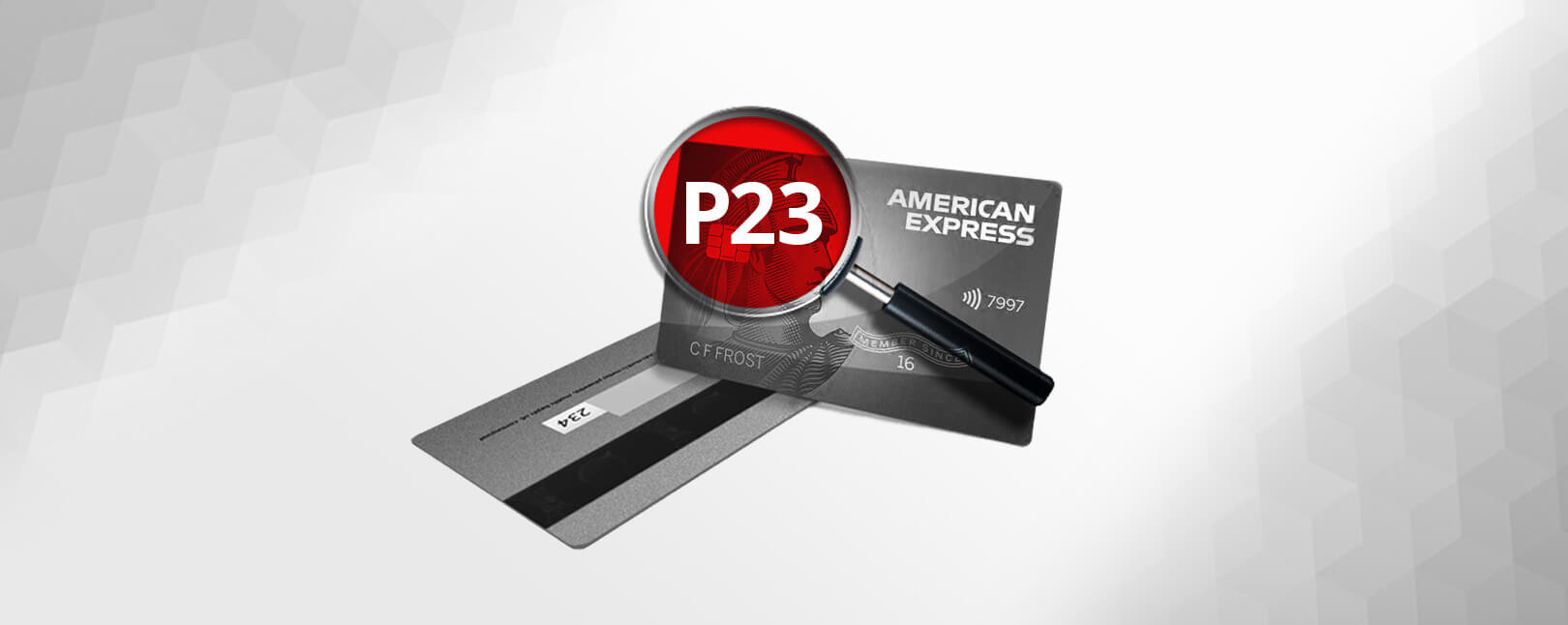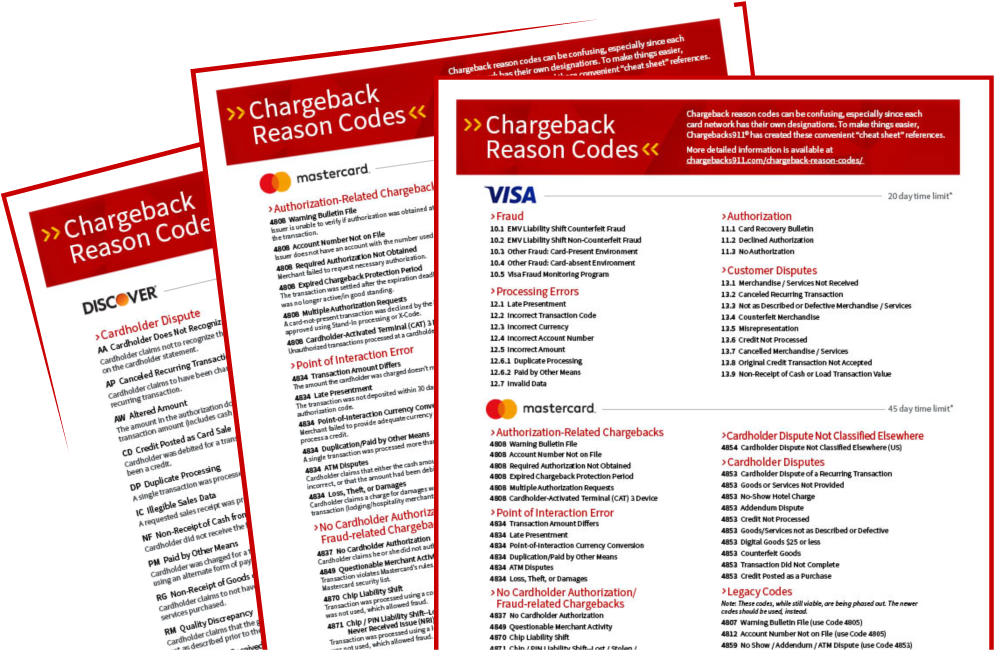
How to Handle Amex Reason Code P23 Chargebacks
American Express breaks down the acceptable causes for a customer to dispute a credit card transaction in their dispute guidelines. This is done for the sake of simplicity and standardization.
Each chargeback trigger has a designated “reason code.” Amex can then assign the appropriate code to each case to show the given reason for the chargeback.
Learn more about Amex reason codes
Today, we’re looking at one reason code in particular — P23 — and exploring the causes, timeframes, fees, and other specifics. We’ll also explore what you can do to prevent these chargebacks from happening.
Recommended reading
- What is Compelling Evidence? Examples & Tips to Win Disputes
- Chargeback Stats: All the Key Dispute Data Points for 2025
- What Happens When You Dispute a Transaction?
- Monica Eaton Named a Finalist for ‘CEO of the Year’!
- Chargebacks911® Honored for “Scary Good” Show Presence!
- PayPal Scam Emails: How They Work | How to Identify & Avoid
What is American Express Reason Code P23?
American Express chargeback reason code P23 is “Currency Discrepancy.” This reason code is used to explain that, when you submitted the charge for processing, it was submitted in an invalid currency.
For example, let’s say you conduct a transaction with a customer. The transaction is denominated in Canadian dollars, and you process the payment as such. But, due to an error in how your point-of-sale machine was configured, the transaction shows up on the cardholder's statement as being denominated in US dollars.
As a result, the cardholder ended up paying a lot more for the purchase than they should have. The cardholder then calls the bank to request a chargeback in response.
What Caused This Dispute?
Amex Chargeback Reason Code P23 is primarily issued when there’s a currency mismatch between you and your customer. To demonstrate, this can happen if:

How to Respond to Amex Reason Code P23 Chargebacks
So, what happens if you can prove that there was no currency mismatch?
Naturally, if you get an Amex P23 chargeback, you’ll want to address the issue fast. If you believe the chargeback was improperly filed, you should submit a dispute response. This is done through a process called representment.
Representment is a standard method for responding to American Express chargebacks. You provide evidence to the card issuer (American Express, in this case), demonstrating that the transaction was valid and complied with all policies.
Amex may require you to produce crucial pieces of evidence to get a chargeback overturned. You need to be mindful of the strict time limit, though; You have just 20 days to submit your response to American Express. This deadline also covers the time your acquirer took to notify you of the dispute, plus the time they spent reviewing and forwarding your case. In practical terms, this often leaves you with five days or fewer to prepare and send your response.
Acceptable Evidence for Amex Reason Code P23 Responses
You can re-represent these charges under the condition that you have compelling evidence.
For American Express reason code P23 chargebacks, you’ll need to provide proof that a charge was submitted in the right currency. For example:
- A receipt showing that the amount charged matches the purchase price in their currency
- A bank statement or foreign exchange rate report verifying the right currency unit was used
- A copy of your policy stating that you don’t accept specific currencies (if applicable)
Another option is to show that you’ve already issued a credit to the buyer in an attempt to prevent the dispute. You'll need to present documentation proving that the credit was provided to offset the charged amount.
The effectiveness of representment hinges on the completeness and pertinence of the evidence you supply. Keeping detailed records of all transactions and communications with customers is crucial for your chargeback response.
How to Prevent Amex Reason Code P23 Chargebacks
As the old adage goes, “an ounce of prevention is worth a pound of cure.”
You may never be able to stop chargebacks entirely. But, you can limit your exposure to risk and keep your chargeback ratio in good standing by adopting a few best practices. Generally speaking, you’ll want to:
#1 | Use the Correct Currency
Process all charges using the currency agreed to by the cardholder at the time of purchase. This is the simplest way to ensure that no problems arise.
#2 | Communicate Clearly with Customers
Make sure that your customers are fully informed, and be proactive about communicating and addressing any concerns that may arise. For example, if you have to charge in a different currency due to cardholder location or your acquirer’s processing capabilities, be transparent about it.
#3 | Keep Accurate Records
Maintaining detailed records of all transactions is crucial for providing evidence during a chargeback dispute. Make sure to keep copies of receipts, invoices, shipping documents, and communication with customers.
#4 | Ensure Your POS & Other Technology is Set Up Properly
Make sure your point-of-sale (POS) system or payment processing technology is set up correctly to prevent technical errors. Conduct regular audits, and double-check that all transactions get processed accurately.
#5 | Stay Compliant with Card Network Rules & Regulations
Follow card network rules and regulations to avoid potential disputes. Stay up to date on changes and updates to network rules.
Take a Wider View
You always have the option to challenge illegitimate chargebacks related to Amex reason code P23. That said, adopting a proactive approach generally yields better results, and this principle applies to all chargeback reason codes.
An effective strategy should include both preventive measures, plus a plan to fight back against first-party misuse of the dispute process. Chargebacks911® offers comprehensive support for managing all chargeback reason codes through advanced technologies and seasoned expertise. Reach out to us today for a complimentary ROI analysis and discover how much more you could save.
FAQs
Does Amex investigate chargebacks?
Yes. American Express investigates chargebacks by reviewing the evidence provided by both the merchant and the cardholder to determine the legitimacy of the transaction and decide on the chargeback claim. This process ensures a fair resolution based on the documentation and arguments presented by both parties.
What is the reason code for a chargeback on American Express card?
An American Express chargeback reason code is a code that identifies the specific reason a cardholder or issuing bank has disputed a transaction, guiding the merchant on the nature of the dispute and what evidence may be required to contest it. Each code corresponds to a particular issue, such as unauthorized use, processing errors, or non-receipt of goods or services. Click here to see a full list of Amex reason codes.
Do police investigate chargebacks?
Police typically do not investigate chargebacks as they are considered a dispute between the merchant and the cardholder, handled through the card issuer's internal processes. However, if fraud is suspected as the cause of a chargeback, law enforcement may be involved in investigating the fraudulent activities.
How successful are Amex disputes?
The success of an American Express dispute depends on the merchant's ability to provide compelling evidence that the transaction was valid and in accordance with Amex policies. Success rates vary widely based on the nature of the dispute and the quality of the documentation provided by the merchant.
How does American Express investigate disputes?
American Express investigates disputes by reviewing documentation and evidence provided by both the cardholder and the merchant, such as transaction receipts, proof of delivery, or communication records, to determine the validity of the chargeback claim. This process aims to ensure a fair resolution based on the facts presented by both parties.









